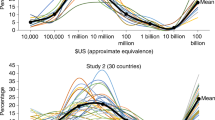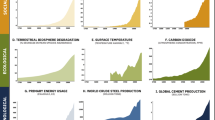Abstract
THE last ten years have witnessed in Great Britain a strong revival of a movement that for at least three generations has been a decisive force in the formation of opinion and the trend of social affairs in Europe: the movement for ‘economic planning’. As in other countries—first in France and then particularly in Germany—this movement has been strongly supported and even led by men of science and engineers. It has now so far succeeded in capturing public opinion that what little opposition there is comes almost solely from a small group of economists. To these economists this movement seems not only to propose unsuitable means for the ends at which it aims; it also appears to them as the main cause of that destruction of individual liberty and spiritual freedom which is the great threat of our age. If these economists are right, a large number of men of science are unwittingly striving to create a state of affairs which they have most reason to fear. It is the purpose of the following sketch to outline the argument on which that view is based.
This is a preview of subscription content, access via your institution
Access options
Subscribe to this journal
Receive 51 print issues and online access
$199.00 per year
only $3.90 per issue
Buy this article
- Purchase on Springer Link
- Instant access to full article PDF
Prices may be subject to local taxes which are calculated during checkout
Similar content being viewed by others
References
P. M. S. Blackett and others, "The Frustration of Science", Allen and Unwin (1935), p. 142.
H. D. Dickinson, "Economics of Socialism", Oxford University Press (1939); O. Lange and F. M. Taylor, "On the Economic Theory of Socialism", University of Minnesota Press (1938); F. A. Hayek, Economica, N.S., 7 (1940).
Final Report of the Temporary National Economic Committee ("T.N.E.C."), U.S.A., 77th Congress, 1st Session, Senate Document No. 35, 89.
L. Hogben, "Education for an Age of Plenty", British Institute of Adult Education (1937), p. 10.
R. Bain, Social Philosophy, 230 (April, 1939).
F. B. Jewett and W. R. King, NATURE, 146, 826 (1940).
W. Lippmann, "The Good Society", Little, Brown and Co. (1937); M. Polanyi, "The Contempt of Freedom", Watts and Co. (1940); W. Sulzbach, Ethics, 50 (April, 1940); F. A. Hayek, "Freedom and the Economic System", University of Chicago Press (1939).
L. Robbins, "Economic Planning and International Order"; Macmillan (1937).
F. Mackenzie (ed.), "Planned Society", Prentice Hall (1937), p. xx.
Final Report of the T.N.E.C., p. 20.
Spectator, 337 (March 3, 1939).
Final Report of the T.N.E.C., p. 5.
Emil du Bois-Reymond, "Kulturwissenschaft und Naturwissen-schaft" (1879).
"A Speech on the German War", Delivered on August 3, 1870, before the University of Berlin, by Emil du Bois-Reymond, at that time Hector. London, Rd. Bentley (1870), p. 31.
J. G. Crowther . "The Social Relations of Science", Macmillan (1940), p. 333.
Author information
Authors and Affiliations
Rights and permissions
About this article
Cite this article
HAYEK, F. PLANNING, SCIENCE AND FREEDOM. Nature 148, 580–584 (1941). https://doi.org/10.1038/148580a0
Issue Date:
DOI: https://doi.org/10.1038/148580a0
This article is cited by
-
Feyerabend, funding, and the freedom of science: the case of traditional Chinese medicine
European Journal for Philosophy of Science (2021)
-
Climate policy: Democracy is not an inconvenience
Nature (2015)
-
An Inconvenient Democracy: Knowledge and Climate Change
Society (2013)
Comments
By submitting a comment you agree to abide by our Terms and Community Guidelines. If you find something abusive or that does not comply with our terms or guidelines please flag it as inappropriate.



